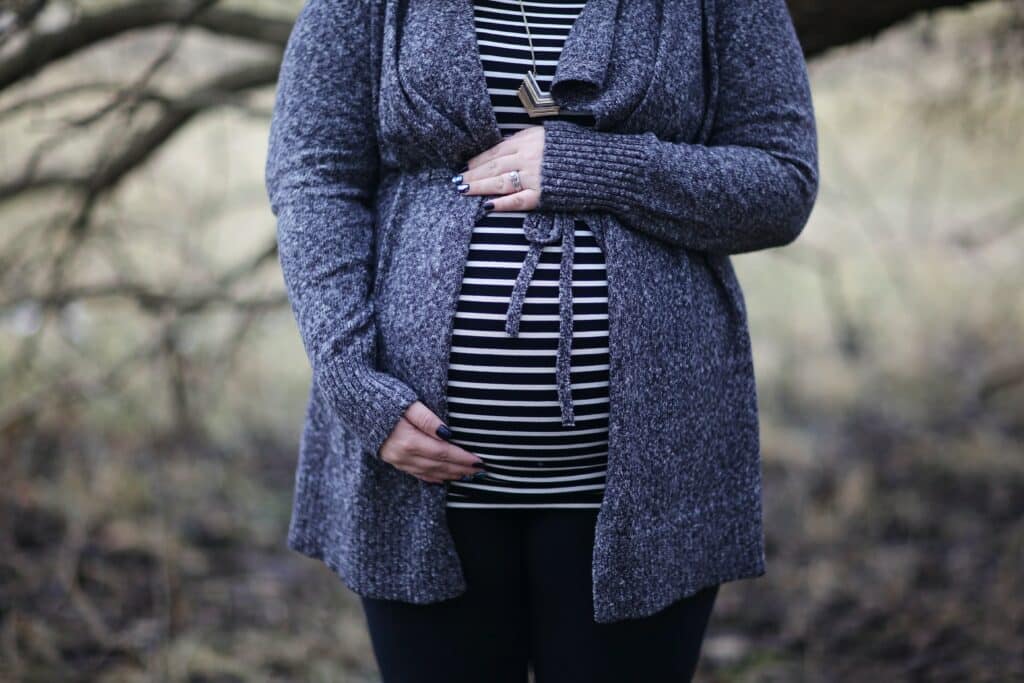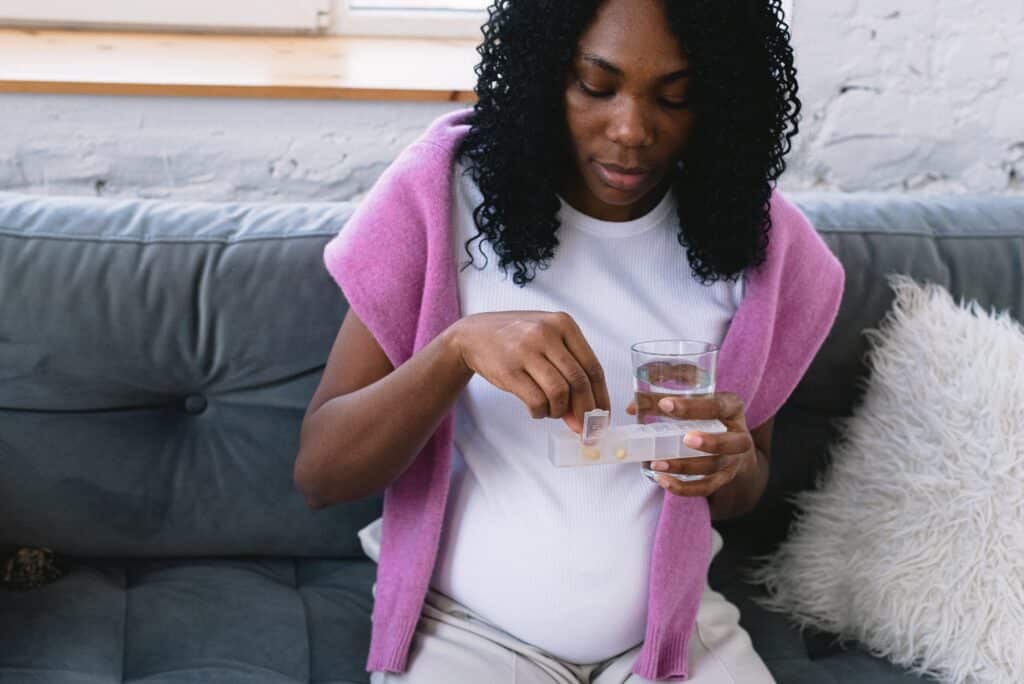
If you find yourself pregnant, you’ll need to consider what’s best for the baby and yourself. However, your situation may be more complicated if you’re facing opioid use disorder during pregnancy, especially if you’ve been using opioids long before conception. Opioid use disorder, a complex aspect of substance use disorders, is a disease, not a choice. No one plans to become consumed by an addictive substance that governs every thought and action. It’s a downward spiral that happens without a day’s planning.
Maybe you began using prescription opioids to treat an injury and became dependent on them, needing higher doses over time. Perhaps you’ve gone through stressful or traumatic events, and the escape that opioid misuse provided was a miscalculated coping mechanism. Regardless of how you got here, you deserve the chance to become a parent, and there is hope for recovery even during pregnancy.
The Risks of Opioid Misuse During Pregnancy
Stopping opioid misuse can feel nearly impossible, even when not pregnant. Once a woman conceives, the symptoms she experiences can make the thought of quitting seem insurmountable. Becoming pregnant while addicted to opioids isn’t a situation to ignore. In fact, ignoring it could lead to an urgent medical crisis. Untreated opioid use disorder during pregnancy can lead to devastating complications. Both the unborn baby and the mother are at risk when a fetus grows in the womb under these conditions.
Unmitigated opioid use during pregnancy can lead to babies being born with neonatal abstinence syndrome (NAS), a significant concern in addiction treatment during pregnancy. Opioids pass through the placenta to the unborn baby, causing neonatal abstinence syndrome. This results in infants being born with a dependency on the substance. NAS can cause feeding problems, low birth weight, respiratory issues, fever, seizures, diarrhea, and restlessness.
In addition, opioid use (or diagnosed opioid use disorder) during pregnancy can lead to permanent congenital disabilities, including potentially fatal heart defects, developmental and behavioral disorders, and autoimmune diseases.
Navigating Withdrawal Safely When Pregnant
If you attempt to stop using opioids while pregnant, withdrawal will occur. When coupled with early pregnancy symptoms, the discomfort and shock to the body can cause unforeseen problems different from detoxing at home when not pregnant.
While withdrawal from opioids is rarely fatal for most people, the stakes are higher for pregnant women. Withdrawing while pregnant can lead to spontaneous miscarriages, including late-term ones, which may require urgent medical intervention. These situations can involve risks of hemorrhaging and lethal infections, such as sepsis. Some women in these circumstances have experienced sudden preterm labor, causing them to deliver premature fetuses in non-medical settings that can lead to the death of both mother and baby.
Ultimately, medical professionals strongly discourage withdrawal or detox without proper medications due to the risks involved. They recommend immediate medical intervention to ensure the health and safety of both the mother and the unborn child.

Suboxone: A Safe Option for Pregnant Woman
The FDA has approved buprenorphine and naloxone, also known as Suboxone, to help pregnant women suffering from opioid addiction. This medication, a cornerstone in medication-assisted treatment (MAT) for opioid use disorder, may be safely used during pregnancy and postpartum while under the supervision of a medical provider.
Buprenorphine in Suboxone, acting as a weak opioid agonist, aids in gradually weaning you off other opioids you may have misused. This component can significantly lessen withdrawal symptoms, offering a powerful approach to easing the transition. It can make the shock of stopping opioids less extreme and have less impact on the baby. Suboxone also contains an opioid antagonist called naloxone, which helps prevent intravenous misuse of the medication. Injecting naloxone can lead to immediate withdrawal symptoms, thus deterring such misuse.
deters intravenous misuse of the medication due to the risk of immediate withdrawal symptoms that will occur if injected.
Any drug containing opioids, including medications used to treat opioid dependence, can cause birth defects. These issues can include congenital heart defects, glaucoma, hydrocephaly, spina bifida, and gastroschisis. These risks make it especially important for expecting mothers to work with skilled medical professionals to treat opioid dependency and to stay fully supervised when undertaking any treatment plan.
Buprenorphine for Opioid Use Disorder During Pregnancy
In many cases, Buprenorphine is prescribed during the second trimester and has been shown to have minimal adverse effects on developing fetuses and newborns when compared to alternatives. However, the medication as be prescribed as soon as pregnancy is confirmed. During your medication-assisted treatment, your OBGYN and prescribing physician will collaborate closely. They will regularly monitor both your health and the health of your unborn child through check-ups, counseling, and continuous supervision.
With Suboxone, the risk of NAS still exists. However, if NAS occurs, the symptoms will usually be much milder when compared to other medications or no treatment at all. The symptoms may also be of shorter duration, lasting up to a week, with a lower chance of medical intervention for the baby. If the delivery room staff is informed that the mother in labor is undergoing medication-assisted treatment, they can develop an appropriate birth plan. This plan ensures that all necessary aspects are covered following the baby’s delivery
Choosing the Safest Treatment Path
In many cases, Suboxone is the option most often suggested to pregnant patients. However, its important to note that each person is different. Working with a medical professional can help you determine the best course for a healthy pregnancy and baby. If you’re pregnant and struggling with opioid addiction, choosing a treatment method and actively seeking medical intervention is crucial, as this issue cannot resolve itself over time. To avoid the potentially fatal risks associated with pregnancy and untreated opioid addiction, explore the benefits of Suboxone. Many women have successfully overcome their challenges, turning their lives around and building families, as evidenced by numerous success stories.

AppleGate Recovery’s Approach to Pregnant Women Battling Opioid Addiction
If you’re pregnant and seeking help, explore our recovery treatment locations. At AppleGate Recovery, we specialize in assisting pregnant women who aim to minimize the risks of opioid addiction, leading to a healthier pregnancy and childbirth. By treating each patient holistically, recognizing their unique needs, we create personalized treatment plans. Our approach includes substance use counseling, medication-assisted treatment, and various supportive solutions, ensuring comprehensive care that sets you on a path to a rewarding future.
Don’t delay in seeking the guidance you need to manage your pregnancy alongside addiction, utilizing medication that has aided many. Contact AppleGate Recovery today—we’re here to embrace and support you every step of the way.
